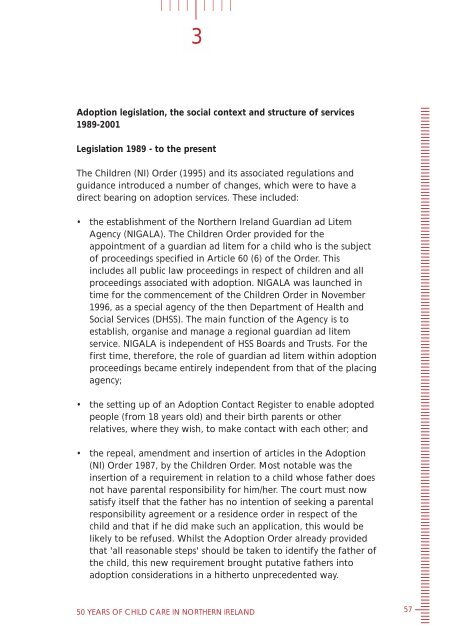childcare-50years
childcare-50years
childcare-50years
Create successful ePaper yourself
Turn your PDF publications into a flip-book with our unique Google optimized e-Paper software.
3<br />
Adoption legislation, the social context and structure of services<br />
1989-2001<br />
Legislation 1989 - to the present<br />
The Children (NI) Order (1995) and its associated regulations and<br />
guidance introduced a number of changes, which were to have a<br />
direct bearing on adoption services. These included:<br />
• the establishment of the Northern Ireland Guardian ad Litem<br />
Agency (NIGALA). The Children Order provided for the<br />
appointment of a guardian ad litem for a child who is the subject<br />
of proceedings specified in Article 60 (6) of the Order. This<br />
includes all public law proceedings in respect of children and all<br />
proceedings associated with adoption. NIGALA was launched in<br />
time for the commencement of the Children Order in November<br />
1996, as a special agency of the then Department of Health and<br />
Social Services (DHSS). The main function of the Agency is to<br />
establish, organise and manage a regional guardian ad litem<br />
service. NIGALA is independent of HSS Boards and Trusts. For the<br />
first time, therefore, the role of guardian ad litem within adoption<br />
proceedings became entirely independent from that of the placing<br />
agency;<br />
• the setting up of an Adoption Contact Register to enable adopted<br />
people (from 18 years old) and their birth parents or other<br />
relatives, where they wish, to make contact with each other; and<br />
• the repeal, amendment and insertion of articles in the Adoption<br />
(NI) Order 1987, by the Children Order. Most notable was the<br />
insertion of a requirement in relation to a child whose father does<br />
not have parental responsibility for him/her. The court must now<br />
satisfy itself that the father has no intention of seeking a parental<br />
responsibility agreement or a residence order in respect of the<br />
child and that if he did make such an application, this would be<br />
likely to be refused. Whilst the Adoption Order already provided<br />
that 'all reasonable steps' should be taken to identify the father of<br />
the child, this new requirement brought putative fathers into<br />
adoption considerations in a hitherto unprecedented way.<br />
50 YEARS OF CHILD CARE IN NORTHERN IRELAND<br />
57


